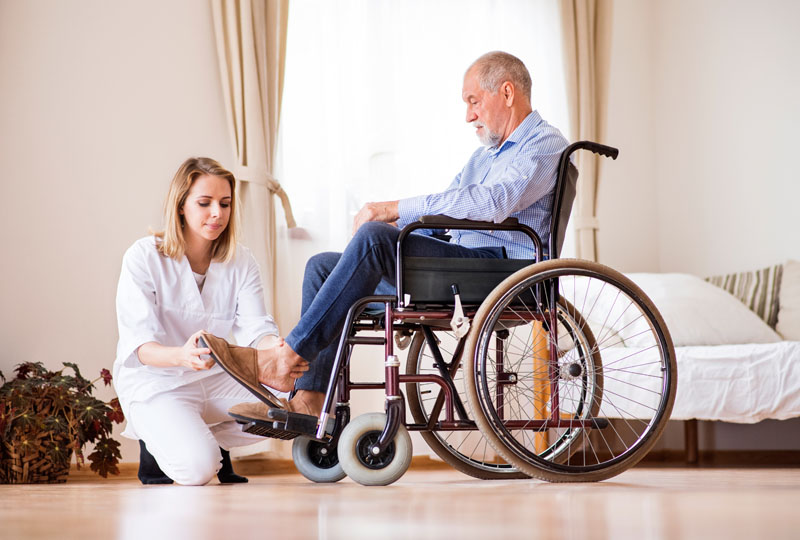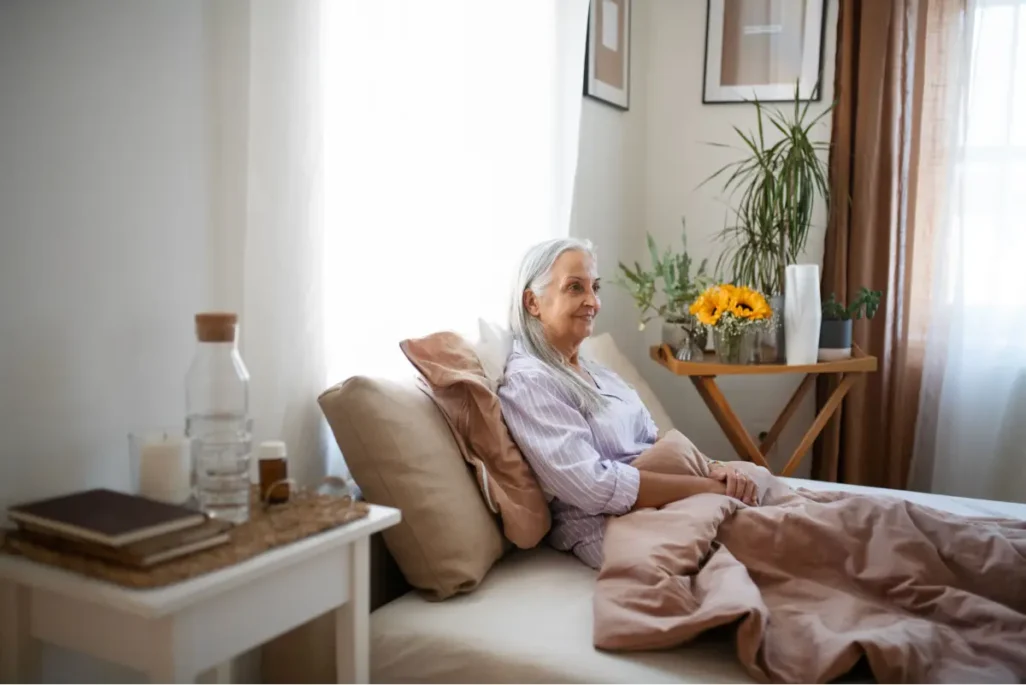Quick Answer: In-home care allows seniors to age in place with professional help for daily activities, companionship, and personal care. Costs average $30-35 per hour nationally in 2026, with services ranging from a few hours weekly to 24/7 care. Most seniors prefer this option over facility care to maintain independence and stay in familiar surroundings.
As we age, many of us face an important decision: how can we continue living independently while getting the support we need? For the overwhelming majority of older adults—94% according to recent surveys—the answer is clear: they want to age in place, remaining in their own homes for as long as possible.
In-home care makes this dream possible. Rather than moving to a facility, seniors can receive professional assistance right where they’re most comfortable, surrounded by their memories, their communities, and the independence they’ve worked a lifetime to maintain.
This comprehensive guide will help you understand everything about in-home care in 2026—what it is, what it costs, how to choose the right provider, and whether it’s the right option for you or your loved one.
In this guide:
- What In-Home Care Really Is
- Types of In-Home Care Services
- Understanding ADLs and IADLs
- Who Should Consider In-Home Care
- What In-Home Care Costs in 2026
- Finding Quality Providers
- Questions to Ask Before Hiring
What Is In-Home Care?
In-home care refers to professional services provided in your own home to help with daily activities, ensure safety, and maintain quality of life. Unlike nursing homes or assisted living facilities, in-home care brings the support to you—allowing you to stay in familiar surroundings while receiving the assistance you need.

Here’s what makes in-home care special:
You maintain control of your life. You set the schedule, choose your caregiver, and decide what help you need. Your home remains your castle.
It’s flexible and personalized. Care can range from just a few hours per week for light housekeeping and companionship to 24/7 personal care for those with more significant needs.
It works wherever you live. While most commonly provided in private homes, in-home care can also serve seniors living in independent senior communities, senior apartments, or with family members.
It supports family caregivers. Many families provide primary care themselves but bring in professional help for respite, specialized tasks, or times when they can’t be there.
How In-Home Care Differs from Other Options
In-home care vs. Assisted Living: Assisted living provides housing, meals, activities, and care in a community setting. In-home care delivers services to your existing home.
In-home care vs. Home Health Care: Home health involves skilled medical services from licensed nurses and therapists. In-home care focuses on non-medical assistance with daily living.
In-home care vs. Independent Living: Independent living offers housing and amenities for active seniors. In-home care can be added to independent living when personal assistance becomes needed.
Types of In-Home Care Services
Understanding the different types of in-home care will help you match services to your needs and budget.
Companion Care
Best for: Seniors who are largely independent but need help with household tasks and benefit from companionship.
Companion care focuses on what healthcare professionals call Instrumental Activities of Daily Living (IADLs)—the tasks that help you live independently but aren’t essential for basic functioning.
Companion caregivers help with:
- Light housekeeping and laundry
- Meal planning and preparation
- Grocery shopping and errands
- Medication reminders (not administration)
- Transportation to appointments
- Social companionship and engagement
- General home management
Companion care is often the starting point for seniors who are living alone and need support staying on top of household responsibilities. It’s also ideal for early-stage memory impairment, when routine and familiar companionship can make a significant difference.
Typical cost in 2026: $25-30 per hour
Personal Care
Best for: Seniors who need hands-on assistance with daily personal tasks.
Personal care is more intensive than companion care. Personal care aides help with Activities of Daily Living (ADLs)—the fundamental tasks we need to perform to maintain basic health and hygiene.
Personal caregivers help with:
- Bathing and showering
- Dressing and grooming
- Toileting and incontinence care
- Eating and feeding assistance
- Transferring (getting in/out of bed, chairs)
- Mobility assistance and fall prevention
- Medication management (organizing, reminding)
Personal care aides are trained to provide dignified, respectful assistance while promoting as much independence as possible. While they cannot administer medications or provide medical care, they work closely with families and healthcare providers to ensure comprehensive support.
Typical cost in 2026: $30-35 per hour
Home Health Care
Best for: Seniors with medical needs requiring skilled nursing or therapy.
Home health care is different from companion and personal care because it involves licensed medical professionals who can perform clinical services prescribed by a doctor.
Home health services include:
- Skilled nursing care (wound care, injections, IV therapy)
- Physical therapy
- Occupational therapy
- Speech therapy
- Medical social workers
- Monitoring of chronic conditions (diabetes, heart disease, COPD)
Home health care is often short-term, prescribed following hospitalization or for specific medical conditions. Medicare typically covers medically necessary home health care when ordered by a physician.
Important distinction: Home health care provides medical services. Companion and personal care provide non-medical support. Many seniors need both—home health for medical needs and personal care for daily living assistance.
Typical cost in 2026: $50-75 per hour for skilled services
For detailed information about home health services and Medicare coverage, read our complete guide: Home Health Medical Care for Seniors

Live-In Care
Best for: Seniors who need round-the-clock supervision and assistance.
Live-in care means a caregiver lives in your home full-time, providing care and supervision 24 hours a day. The caregiver has their own bedroom and receives breaks for sleep and meals, but is available throughout the day and night.
Live-in care offers several advantages:
- Continuous presence for safety and companionship
- Consistent relationship with one caregiver (or two alternating)
- Often more affordable than paying hourly for 24/7 care
- Allows family members to work and manage their own responsibilities
Typical cost in 2026: $200-350 per day
Understanding Activities of Daily Living (ADLs and IADLs)
Healthcare professionals assess care needs based on two categories of daily activities. Understanding these helps you identify what type of care you need.
Activities of Daily Living (ADLs)
These are the six fundamental tasks required for basic functioning:
- Bathing – Washing oneself in shower, tub, or at sink
- Dressing – Selecting appropriate clothes and putting them on
- Eating – Getting food from plate to mouth
- Toileting – Using the bathroom and managing hygiene
- Transferring – Moving between bed, chair, wheelchair
- Continence – Managing bladder and bowel control
Difficulty with even one or two ADLs typically indicates a need for personal care services. Inability to perform most ADLs often means facility care like assisted living or a skilled nursing home may be more appropriate, though some families manage with extensive in-home care.
Long-term care insurance policies often require help with 2-3 ADLs before coverage begins.
Instrumental Activities of Daily Living (IADLs)
These activities support independent living and quality of life:
- Housekeeping and home maintenance
- Meal planning, preparation, and cleanup
- Laundry and clothing care
- Shopping and running errands
- Managing medications
- Transportation and driving
- Managing finances and bills
- Using telephone and technology
Difficulty with IADLs—while still being able to perform ADLs independently—typically indicates companion care is appropriate.
Who Should Consider In-Home Care?
In-home care isn’t right for everyone, but it’s an excellent option if you can answer “yes” to these questions:
1. Do you want to stay in your home long-term? If home is where you feel most comfortable and independent, in-home care can make that possible even as your needs increase.
2. Is your home reasonably safe and accessible? While some modifications may be needed (grab bars, ramps, stair lifts), your home should be able to accommodate safe care. Multi-story homes without bathrooms on the main floor may need adjustments.
3. Are you in relatively good health—or do you have medical needs that can be managed at home? In-home care works well for those who don’t need constant medical supervision. Even with chronic conditions like diabetes, heart disease, or COPD, many people receive excellent care at home with a combination of home health and personal care.
4. Do you have family or community support? While professional caregivers provide daily assistance, having family, neighbors, or friends who can help with emergencies, major decisions, or additional support creates a stronger safety net.
5. Can you afford in-home care or access funding sources? At $30-35 per hour, costs add up quickly. However, many funding sources exist (Medicare, Medicaid, veterans benefits, insurance), and in-home care is often significantly less expensive than facility care for moderate care needs.
Learn about all your payment options in our companion guide: How to Pay for In-Home Care: 7 Options Families Should Know
When In-Home Care May NOT Be the Best Option
Consider assisted living, memory care, or skilled nursing instead if:
- You need 24/7 medical supervision for complex health conditions
- You require specialized equipment or facilities
- Your home is unsafe or severely deteriorated
- You are completely isolated with no family or community support
- You have severe dementia with wandering or aggressive behaviors
- The costs of sufficient in-home care exceed facility care in your area
- You would benefit from the social interaction and activities of community living
What Does In-Home Care Cost in 2026?
According to recent industry surveys, in-home care costs have risen steadily in 2026, reflecting increased demand, improved caregiver wages, and inflation. Here’s what you need to know.
National Average Costs
Hourly rates:
- Companion care: $25-30 per hour
- Personal care: $30-35 per hour
- Home health aide: $35-40 per hour
- Skilled nursing: $50-75 per hour
Monthly costs based on different care schedules:
- 7 hours per week: $875-1,050/month
- Light help with housekeeping and companionship
- 15 hours per week: $1,950-2,100/month
- Daily check-ins for 2-3 hours
- 30 hours per week: $3,900-4,200/month
- Substantial daily support
- 44 hours per week: $5,700-6,500/month
- Extensive care covering most of the day
- 24/7 live-in care: $20,000-24,000/month
- Round-the-clock supervision and assistance
Regional Cost Differences
In-home care costs vary significantly by location. Based on 2026 market data:
Most Expensive States:
- Maine: $40-45/hour
- Washington, Minnesota: $38-42/hour
- South Dakota, North Dakota: $38-40/hour
Least Expensive States:
- Louisiana, Mississippi: $23-26/hour
- West Virginia, Arkansas: $25-28/hour
- Alabama: $27-28/hour
Southeast States:
- Alabama: $27-28/hour
- Tennessee: $28-30/hour
- Georgia: $29-31/hour
- Florida: $30-32/hour
- North Carolina: $30-32/hour
- South Carolina: $28-30/hour
Urban areas within each state typically run 10-20% higher than rural areas.
What Affects Your Personal Cost?
Several factors influence your final bill:
Hours of care needed: The more hours, the higher total cost—though some agencies offer volume discounts.
Type of care: Companion care costs less than personal care, which costs less than skilled nursing.
Day vs. night rates: Overnight care may cost less if the caregiver sleeps. Weekend and holiday care often costs 10-25% more.
Agency vs. independent: Agencies charge 20-30% more than independent caregivers but provide backup, supervision, and insurance.
Minimum hours: Most agencies require 2-4 hour minimums per visit or certain weekly minimums.
Additional fees: Some agencies charge for travel time, care coordination, or medical supplies.
Comparing Costs: In-Home Care vs. Facilities
In-home care (44 hours/week): $5,700-6,500/month
Assisted living: $4,500-5,500/month
Memory care: $6,000-7,500/month
Nursing home (semi-private): $8,500-9,500/month
Nursing home (private room): $10,500-11,500/month
For seniors needing less than 40-50 hours of care per week, in-home care is often more affordable than facility care. For those requiring 24/7 supervision, assisted living or nursing home care may be more cost-effective.
For a detailed breakdown of payment options including Medicare, Medicaid, veterans benefits, and insurance, read: How to Pay for In-Home Care: 7 Options

Finding Quality In-Home Care Providers
Finding the right caregiver or agency is one of the most important decisions you’ll make. Here’s how to do it right.
Agency vs. Independent Caregiver
Home Care Agency:
Pros:
- Background checks and screening completed
- Bonded and insured
- Backup caregivers available
- Supervision and quality oversight
- Handles payroll and taxes
- Often Medicare/Medicaid certified
Cons:
- Costs 20-30% more
- Less scheduling flexibility
- May rotate different caregivers
- Minimum hour requirements
Independent Caregiver:
Pros:
- Lower hourly cost
- More scheduling flexibility
- Consistent caregiver
- May feel more personal
Cons:
- YOU must handle background checks
- YOU become the employer (taxes, insurance)
- No backup if caregiver is sick
- Less oversight
- May not be covered by insurance
Where to Find In-Home Care
Online directories:
- Senioridy’s In-Home Care Directory – Search providers in your area
- State licensing agency websites
- National provider networks
Professional referrals:
- Your doctor or hospital discharge planner
- Area Agency on Aging
- Friends and family who have used services
- Senior centers and community groups
Local resources:
- Home care agencies in your area
- Visiting nurse associations
- Community health centers
Licensing and Certification to Look For
For agencies:
- State home care license (required in most states)
- Medicare certification (if using Medicare)
- Medicaid certification (if using Medicaid)
- Better Business Bureau rating
- Professional association membership
For individual caregivers:
- Certified Nursing Assistant (CNA) credential
- Home Health Aide (HHA) certification
- CPR and First Aid certification
- Background check completion
- References from previous employers
10 Essential Questions to Ask Before Hiring
Use these questions to evaluate agencies or caregivers:
About the Agency
- Are you licensed and bonded in this state? Verify with your state licensing agency.
- How long have you been in business? Longer track record generally indicates stability.
- Do you conduct background checks on all caregivers? Should include criminal history, driving record, and references.
- Are your caregivers employees or independent contractors? Employees mean the agency handles liability and insurance.
- What training do your caregivers receive? Ask about both initial and ongoing training.
About Care and Costs
- Who supervises the caregivers? Should have a nurse or supervisor conducting home visits.
- What happens if our regular caregiver is sick? Should have a clear backup plan.
- What are your rates and what’s included? Get specifics on hourly rates, minimum hours, weekend/holiday rates.
- Do you accept insurance, Medicare, or Medicaid? Important if you plan to use these payment sources.
- What is your cancellation policy? Understand terms if you need to reduce hours or stop service.
About the Caregiver Match
Bonus questions:
- Can we meet the caregiver before services begin?
- Can we request a different caregiver if needed?
- How do you match caregivers with clients?
- What is your caregiver turnover rate?
Making the Decision: Is In-Home Care Right for You?
In-home care works best when:
- You strongly prefer staying in your home
- Your home is safe and can be modified as needed
- You have support from family or community
- You can afford it through savings, insurance, or benefits
- Your care needs don’t require 24/7 medical supervision
- You value independence and control over your routine
Consider facility options when:
- You’re socially isolated and would benefit from community
- Your home requires major modifications you can’t afford
- You need specialized memory care or constant medical supervision
- The cost of sufficient in-home care exceeds facility care
- You’d feel safer with round-the-clock professional presence
Many families use a combination approach—starting with occasional companion care and increasing services as needs grow, sometimes eventually transitioning to facility care if appropriate.
There’s no single right answer. The best choice meets your needs, fits your budget, supports your health, and honors your preferences.
Next Steps
If in-home care seems right for you:
- Assess current needs – Identify what help is truly needed
- Evaluate your home – Consider safety and accessibility
- Determine budget – Calculate what you can afford and explore funding options
- Research providers – Search Senioridy’s directory and get referrals
- Interview candidates – Talk to at least 3 agencies or caregivers
- Start small – Begin with fewer hours and adjust as needed
Related Resources
- How to Pay for In-Home Care: 7 Options Families Should Know
- Home Health Medical Care for Seniors
- Hospice Care at Home: What Families Should Know
- Assisted Living for Seniors
- Search In-Home Care Providers Near You
Need help finding in-home care in your area? Search Senioridy’s directory of in-home care providers or explore other senior living options.

